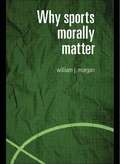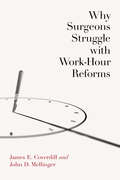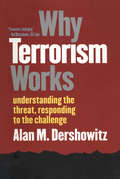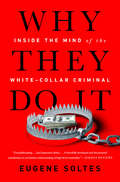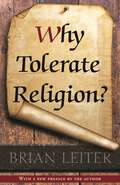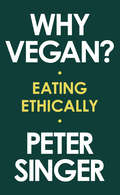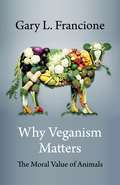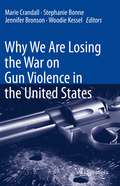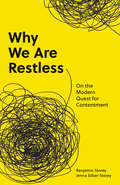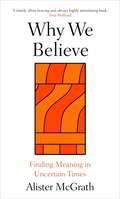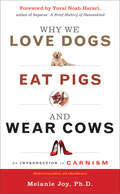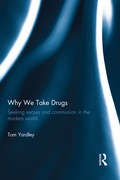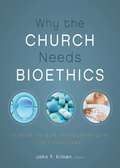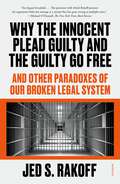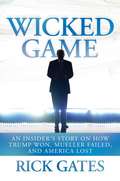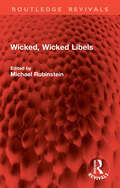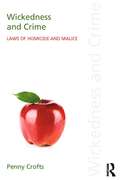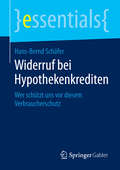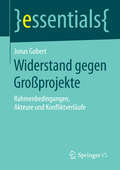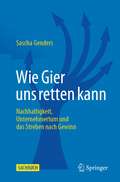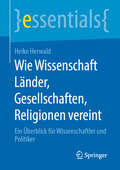- Table View
- List View
Why Sports Morally Matter (Routledge Critical Studies in Sport)
by William MorganWhen we accept that advertisers and sponsors dictate athletic schedules, that success in sport is measured by revenue, that athletes’ loyalties lie with their commercial agents instead of teams and that game rules exist to be tested and broken in the pursuit of a win, what does our regard for sport say about the moral and political well-being of our society? Why Sports Morally Matter is a deeply critical examination of pressing ethical issues in sports – and in society as a whole. Exploring the broad historical context of modern America, William J. Morgan argues that the current state of sports is a powerful indictment of our wealth-driven society and hyper-individualistic way of life. Taking on critics from all sides of the political debate, Morgan makes the case that, despite the negating effect of free market values, sport still possesses important features that encourage social, moral and political values crucial to the flourishing of a democratic polity. It is this potential to transform society and the individual that makes sport a key battleground in the struggle for the moral soul of twenty-first century America.
Why Surgeons Struggle with Work-Hour Reforms
by James E. Coverdill John D. MellingerOn July 1, 2003, work-hour reforms were enacted nationally for the roughly 129,000 resident physicians in the United States. The reforms limit weekly work hours (a maximum of eighty per week) and in-hospital call (no more than once every three nights), mandate days free of clinical and educational obligations (one day in seven), and regulate other aspects of resident work life.Why Surgeons Struggle with Work-Hour Reforms focuses on general surgeons, a historically long-hour specialty, who fiercely opposed the reforms and are among the least compliant. Why do surgeons struggle with the reforms? Why do they continue to work long hours and view the act of doing so as reasonable if not quintessentially professional? Although the analysis is situated in the growing scientific literature on the consequences of fatigue, the authors do not adjudicate between the claims of surgeons and reform advocates about the effects of long work hours on patient or provider safety. Rather, the aim is to explore and explain how aspects of the occupational culture of surgeons and the social organization of surgical training and practice interlock to impede the reforms.
Why Terrorism Works
by Alan M. DershowitzThe greatest danger facing the world today, says Alan M. Dershowitz, comes from religiously inspired, state sponsored terrorist groups that seek to develop weapons of mass destruction for use against civilian targets. In his newest book, Dershowitz argues passionately and persuasively that global terrorism is a phenomenon largely of our own making and that we must and can take steps to reduce the frequency and severity of terrorist acts.Analyzing recent acts of terrorism and our reaction to them, Dershowitz explains that terrorism is successful when the international community gives in to the demands of terrorists-or even tries to understand and eliminate the "root causes" of terrorism. He discusses extreme approaches to wiping out international terrorism that would work if we were not constrained by legal, moral, and humanitarian considerations. And then, given that we do operate under such constraints, he offers a series of proposals that would effectively reduce the frequency and severity of international terrorism by striking a balance between security and liberty.
Why They Do It: Inside the Mind of the White-Collar Criminal
by Eugene SoltesFrom the financial fraudsters of Enron, to the embezzlers at Tyco, to the insider traders at McKinsey, to the Ponzi schemer Bernie Madoff, the failings of corporate titans are regular fixtures in the news. But what drives wealthy and powerful people to white-collar crime? Harvard Business School professor Eugene Soltes draws from extensive personal interaction and correspondence with nearly fifty former executives as well as the latest research in psychology, criminology, and economics to investigate how once-celebrated executives become white-collar criminals. The product of seven years in the company of the men behind the largest corporate crimes in history, Why They Do It is a breakthrough look at the dark side of the business world.Soltes reveals how the usual explanations fail to tell the whole story of why many seemingly successful people go over the line. White-collar criminals are not merely driven by excessive greed or hubris, nor do they usually carefully calculate costs and benefits before breaking the law. Instead, Soltes shows that most of the executives who committed crimes made decisions the way we all do—on the basis of their intuitions and gut feelings. The trouble is that these gut feelings are often poorly suited for the modern business world where leaders are increasingly distanced from the consequences of their decisions and the individuals they impact.The extraordinary costs of corporate misconduct are clear to its victims. Yet, never before have we been able to peer so deeply into the minds of the many prominent perpetrators of white-collar crime. With the increasing globalization of business threatening us with even more devastating corporate misconduct, the lessons Soltes draws in Why They Do It are needed more urgently than ever.
Why Tolerate Religion?: Updated Edition
by Brian LeiterWhy it's wrong to single out religious liberty for special legal protectionsThis provocative book addresses one of the most enduring puzzles in political philosophy and constitutional theory—why is religion singled out for preferential treatment in both law and public discourse? Why are religious obligations that conflict with the law accorded special toleration while other obligations of conscience are not? In Why Tolerate Religion?, Brian Leiter shows why our reasons for tolerating religion are not specific to religion but apply to all claims of conscience, and why a government committed to liberty of conscience is not required by the principle of toleration to grant exemptions to laws that promote the general welfare.
Why Torture Doesn't Work: The Neuroscience of Interrogation
by Shane O'MaraBesides being cruel and inhumane, torture does not work the way torturers assume it does. As Shane O'Mara's account of the neuroscience of suffering reveals, extreme stress creates profound problems for memory, mood, and thinking, and sufferers predictably produce information that is deeply unreliable, or even counterproductive and dangerous.
Why Vegan?: Eating Ethically (Penguin Great Ideas Ser.)
by Peter SingerIn a world reeling from a global pandemic, never has a treatise on veganism—from our foremost philosopher on animal rights—been more relevant or necessary. “Peter Singer may be the most controversial philosopher alive; he is certainly among the most influential.” —The New Yorker Even before the publication of his seminal Animal Liberation in 1975, Peter Singer, one of the greatest moral philosophers of our time, unflinchingly challenged the ethics of eating animals. Now, in Why Vegan?, Singer brings together the most consequential essays of his career to make this devastating case against our failure to confront what we are doing to animals, to public health, and to our planet. From his 1973 manifesto for Animal Liberation to his personal account of becoming a vegetarian in “The Oxford Vegetarians” and to investigating the impact of meat on global warming, Singer traces the historical arc of the animal rights, vegetarian, and vegan movements from their embryonic days to today, when climate change and global pandemics threaten the very existence of humans and animals alike. In his introduction and in “The Two Dark Sides of COVID-19,” cowritten with Paola Cavalieri, Singer excoriates the appalling health hazards of Chinese wet markets—where thousands of animals endure almost endless brutality and suffering—but also reminds westerners that they cannot blame China alone without also acknowledging the perils of our own factory farms, where unimaginably overcrowded sheds create the ideal environment for viruses to mutate and multiply. Spanning more than five decades of writing on the systemic mistreatment of animals, Why Vegan? features a topical new introduction, along with nine other essays, including: • “An Ethical Way of Treating Chickens?,” which opens our eyes to the lives of the birds who end up on so many plates—and to the lives of their parents; • “If Fish Could Scream,” an essay exposing the utter indifference of commercial fishing practices to the experiences of the sentient beings they scoop from the oceans in such unimaginably vast numbers; • “The Case for Going Vegan,” in which Singer assembles his most powerful case for boycotting the animal production industry; • And most recently, in the introduction to this book and in “The Two Dark Sides of COVID-19,” Singer points to a new reason for avoiding meat: the role eating animals has played, and will play, in pandemics past, present, and future. Written in Singer’s pellucid prose, Why Vegan? asserts that human tyranny over animals is a wrong comparable to racism and sexism. The book ultimately becomes an urgent call to reframe our lives in order to redeem ourselves and alter the calamitous trajectory of our imperiled planet.
Why Veganism Matters: The Moral Value of Animals (Critical Perspectives on Animals: Theory, Culture, Science, and Law)
by Gary FrancioneMost people care about animals, but only a tiny fraction are vegan. The rest often think of veganism as an extreme position. They certainly do not believe that they have a moral obligation to become vegan.Gary L. Francione—the leading and most provocative scholar of animal rights theory and law—demonstrates that veganism is a moral imperative and a matter of justice. He shows that there is a contradiction in thinking that animals matter morally if one is also not vegan, and he explains why this belief should logically lead all who hold it to veganism. Francione dismantles the conventional wisdom that it is acceptable to use and kill animals as long as we do so “humanely.” He argues that if animals matter morally, they must have the right not to be used as property. That means that we cannot eat them, wear them, use them, or otherwise treat them as resources or commodities.Why Veganism Matters presents the case for the personhood of nonhuman animals and for veganism in a clear and accessible way that does not require any philosophical or legal background. This book offers a persuasive and powerful argument for all readers who care about animals but are not sure whether they have a moral obligation to be vegan.
Why We Are Losing the War on Gun Violence in the United States
by Marie Crandall Stephanie Bonne Jennifer Bronson Woodie KesselThis edited collection of data and perspectives takes a fresh approach to gun violence prevention by addressing the question, “why are we losing the war on gun violence in America?” Although successes and failures in the prevention of gun violence are examined, it is a war we are losing, due to restrictions on research funding, entrenched historical perspectives, structural violence, and perhaps differing priorities or views on what is right or wrong.Gun violence is a public health crisis. It remains politicized and has been paralyzed with inaction. In the chapters, the authors write candidly about the challenges that have thwarted gun violence prevention, as well as highlight possible strategies for progress to save lives. Critical areas explored among the chapters include:Gun Violence, Structural Violence, and Social JusticeSchool Shootings: Creating Safer SchoolsMental Illness and Gun ViolenceUnderstanding the Political Divide in Gun Policy SupportThe Second Amendment and the War on GunsThe Impact of Policy and Law Enforcement Strategies on Reducing Gun Violence in AmericaYouth Gun Violence Prevention OrganizingSmart Guns Don't Kill PeopleWith this compendium, the editors and authors hope to bridge the growing gap between groups or ideologies, and create common ground to discuss workable solutions. Why We Are Losing the War on Gun Violence in the United States is essential reading for a broad audience including practitioners, academics, researchers, students, policy-makers, and other professionals in public health, behavioral sciences (including social work and psychology), social sciences, health sciences, public policy, political science, and law, as well as any readers interested in the path to decreasing gun violence in America.
Why We Are Restless: On the Modern Quest for Contentment (New Forum Books #65)
by Benjamin Storey Jenna Silber StoreyA compelling exploration of how our pursuit of happiness makes us unhappyWe live in an age of unprecedented prosperity, yet everywhere we see signs that our pursuit of happiness has proven fruitless. Dissatisfied, we seek change for the sake of change—even if it means undermining the foundations of our common life. In Why We Are Restless, Benjamin and Jenna Storey offer a profound and beautiful reflection on the roots of this malaise and examine how we might begin to cure ourselves.Drawing on the insights of Montaigne, Pascal, Rousseau, and Tocqueville, Why We Are Restless explores the modern vision of happiness that leads us on, and the disquiet that follows it like a lengthening shadow. In the sixteenth century, Montaigne articulated an original vision of human life that inspired people to see themselves as individuals dedicated to seeking contentment in the here and now, but Pascal argued that we cannot find happiness through pleasant self-seeking, only anguished God-seeking. Rousseau later tried and failed to rescue Montaigne’s worldliness from Pascal’s attack. Steeped in these debates, Tocqueville visited the United States in 1831 and, observing a people “restless in the midst of their well-being,” discovered what happens when an entire nation seeks worldly contentment—and finds mostly discontent.Arguing that the philosophy we have inherited, despite pretending to let us live as we please, produces remarkably homogenous and unhappy lives, Why We Are Restless makes the case that finding true contentment requires rethinking our most basic assumptions about happiness.
Why We Believe: Finding Meaning in Uncertain Times
by Prof. Alister McGrathBelief: surely it&’s a relic from the past, a hangover from a superstitious age that is totally out of sync with today&’s rational, science-led culture? 'A timely, often bracing and always highly stimulating book.' Tom Holland, author of Dominion and co-host of The Rest is History In today&’s science-driven, rational world, belief is dismissed as an artefact of a bygone era – something absurd at best, harmful at worst. The prevailing narratives paint belief as primitive, weird, even dangerous. But as life grows ever more confusing and our societies more atomised, contemplating something bigger than ourselves has never been more vital. Alister McGrath offers a fresh perspective on belief, presenting it not as a weakness of rational thought but as an essential tool for navigating uncertainty. Elegant and thought-provoking, Why We Believe reveals how belief provides meaning in the face of existential despair, how it fosters community and offers solace. As society moves beyond the dismissive rhetoric surrounding people of faith, here is a powerful manifesto for the re-enchantment of the Western mind. 'Scholarly, compulsively readable and with gems of information on every page... a must read.' Revd Fergus Butler-Gallie, author of A Field Guide to the English Clergy
Why We Love Dogs, Eat Pigs, and Wear Cows: An Introduction to Carnism
by Melanie Joy&“An absorbing examination of why humans feel affection and compassion for certain animals but are callous to the suffering of others.&” —Publishers WeeklyWhy We Love Dogs, Eat Pigs, and Wear Cows offers an absorbing look at what social psychologist Melanie Joy calls carnism, the belief system that conditions us to eat certain animals when we would never dream of eating others. Carnism causes extensive animal suffering and global injustice, and it drives us to act against our own interests and the interests of others without fully realizing what we are doing. Becoming aware of what carnism is and how it functions is vital to personal empowerment and social transformation, as it enables us to make our food choices more freely—because without awareness, there is no free choice. &“An important and groundbreaking contribution to the struggle for the welfare of animals.&” —Yuval Harari, New York Times–bestselling author &“An exposé of the ideas, prejudices, and numbing of men and women who block out the unsavory details of what is involved in the creation and consumption of animal-based foods.&” —Spirituality & Practice &“With eloquence and humility, Melanie Joy appeals to the values that all of us already have and have always had. She reminds us of who we are.&” —Jonathan Safran Foer, New York Times–bestselling author &“Melanie Joy examines the psychological props that make it possible for us to adore some animals and eat others—and kicks them all aside.&” —Peter Singer, professor of bioethics at Princeton University and author of Animal Liberation Now
Why We Take Drugs: Seeking Excess and Communion in the Modern World
by Tom YardleyIn older cultures, the use of intoxicant drugs was integrated into the rhythms of social existence and bounded by rituals and taboos that ensured their dangerous forces were contained and channelled. In modern western societies, by contrast, the state and the institutions of society have washed their hands of any responsibility for assimilating the desire for intoxication into social existence, and by doing so have sponsored a free-for-all that has often had disastrous consequences for individuals and communities alike. Why We Take Drugs provides a timely intervention in the growing debate about the wisdom of the ongoing ‘war on drugs’. Rather than adopting the assumption that drug and alcohol use is a problem that poses a threat to society, this book makes a case for the idea that society is a problem for intoxicant drug use and that it is society that poses a threat, by denying those who seek intoxication a legitimate and socially sanctioned space in which to experience these altered states. Scholarly yet approachable, it provides a new understanding of the meaning and role of intoxicant drug use in contemporary society, setting an in-depth phenomenological analysis of intoxication as an embodied experience within a wide sociological, anthropological and historical context. These ideas are brought to life by intimate and revealing accounts of ordinary drug users’ experiences with a wide range of substances. This book will appeal to a wide range of students and scholars throughout the social sciences, particularly in the areas of drug and alcohol studies, body studies, cultural studies, anthropology and philosophy.
Why the Church Needs Bioethics: A Guide to Wise Engagement with Life’s Challenges
by John F. KilnerIn a world where incredible medical technologies are possible … does “can do” mean “should do”? Why the Church Needs Bioethics helps you understand and constructively engage bioethical challenges with the resources of Christian wisdom and ministry. Three rich and true-to-life case studies illustrate the urgency of such bioethical issues as reproductive and genetic technologies, abortion, forgoing treatment, assisted suicide, stem cell research, and human enhancement technologies. Leading Christian voices bring biblical and theological perspective to bear on the incredible medical technologies available today; mobilize useful insights from health care, law, and business; and demonstrate the powerful ways the church can make a difference through counseling, pastoral care, intercultural ministry, preaching, and education. This book equips students, church and lay leaders, and people in health-related fields with the knowledge to make faithful bioethical decisions and to help foster a world where human beings are shown respect as people created in the image of God. Contributors to Why the Church Needs Bioethics include leading Bible and theology scholars, such as D. A. Carson and Kevin Vanhoozer; leaders in the areas of preaching (Greg Scharf) and ethics (Scott Rae); and 15 other experts in the fields of biblical-theological studies, ministry, communication, business, law, healthcare, and bioethics.
Why the Innocent Plead Guilty and the Guilty Go Free: And Other Paradoxes of Our Broken Legal System
by Judge Jed S. RakoffA senior federal judge’s incisive, unsettling exploration of some of the paradoxes that define the judiciary today, Why the Innocent Plead Guilty and the Guilty Go Free features essays examining why innocent people plead guilty, why high-level executives aren’t prosecuted, why you won’t get your day in court, and why the judiciary is curtailing its own constitutionally mandated power.How can we be proud of a system of justice that often pressures the innocent to plead guilty? How can we claim that justice is equal when we imprison thousands of poor Black men for relatively modest crimes but rarely prosecute rich white executives who commit crimes having far greater impact? How can we applaud the Supreme Court’s ever-more-limited view of its duty to combat excesses by the president?The federal judge Jed S. Rakoff, a leading authority on white-collar crime, explores these and other puzzles in Why the Innocent Plead Guilty and the Guilty Go Free, a startling account of our broken legal system. Grounded in Rakoff’s twenty-four years as a federal trial judge in New York in addition to the many years he worked as a federal prosecutor and criminal defense lawyer, Rakoff ’s assessment of our justice system illuminates some of our most urgent legal, social, and political issues: plea deals and class-action lawsuits, corporate impunity and the death penalty, the perils of eyewitness testimony and forensic science, the war on terror and the expanding reach of the executive branch. A fundamental problem, he reveals, is that the judiciary is constraining its own constitutional powers.Like few others, Rakoff understands the values that animate the best aspects of our legal system—and has a close-up view of our failure to live up to these ideals. But he sees within this gap great opportunities for practical reform, and a public mandate to make our justice system truly just.
Wicked Game: An Insider's Story on How Trump Won, Mueller Failed, and America Lost
by Rick GatesAs featured in The Washington Post and Bloomberg! In a factual firsthand account of this turbulent period in our nation&’s history, Donald Trump&’s 2016 deputy campaign chairman takes us deep behind the scenes to examine the truth about how Trump won, why the Mueller investigation failed, and how the current state of presidential politics is tearing apart the very fabric of our democracy.Rick Gates, who served as Donald Trump&’s deputy campaign chairman in 2016 and as a cooperating witness in the Mueller investigation, gives readers a rare, in-depth look at one of the most controversial elections—and presidents—in U.S. history. From a perspective only he can offer, Rick answers the important questions: How was Trump able to beat sixteen high-profile, experienced Republican contenders, and Hillary Clinton, to win in 2016? How did the campaign work? What really happened with Russian election interference and the Mueller investigation? And more. With refreshing candor, Rick shares his story, observations, and facts with the intent that readers form their own opinions and draw their own conclusions. The result is a thought-provoking account that informs and educates readers on both sides of the political aisle as we approach the 2020 election. In up-close detail, Rick takes us through his personal journey to explain how Trump defied the odds, the polls, and even his own party to become the 45th president of the United States. He shares pivotal moments behind the scenes of the campaign and inauguration that have never been shared before, revealing critical decisions and political tactics that explain how Donald Trump was able to upset the entire Republican political establishment and beat a system built on centuries-old traditions. He also shows us how Donald Trump brought his personal brand to the presidency and how, in the end, the political establishment had no choice but to adapt to him—because Trump would never adapt to them. Following the inauguration, Rick was entangled in the Robert Mueller investigation on Russian election interference. In Wicked Game, Rick lifts the veil to detail exactly what happened behind the operations of the Mueller probe, providing the first major account from an insider indicted in the investigation. In the government&’s sentencing memo in their case against him, federal prosecutors took the unusual step of praising Rick for his &“extraordinary assistance&” in their efforts: &“Gates has worked assiduously to provide truthful, complete, and reliable information,&” they wrote. Which makes it all the more compelling when Rick&’s account reveals the inadequacies of our legal system, and how a small group of people in Washington manipulated the political system for their own purposes—undermining our democracy in the process. History has its eyes on America, and as people all over the world try to understand Trump&’s presidency in a time of global crisis and uncertainty heading into the 2020 election, Rick&’s powerful, firsthand account provides revealing and factual insights that he hopes Republicans and Democrats alike will learn from and apply as our nation moves forward.
Wicked, Wicked Libels (Routledge Revivals)
by Michael Rubinstein‘The law of libel is the instrument of censorship by which dignity—too often pseudo-dignity—is to be upheld.’ That is Michael Rubinstein’s definition in his introduction to this lively and authoritative account Wicked, Wicked Libels (originally published in 1972) of the libel situation in Britain.The contributors are all actively concerned about libel as a living issue. Michael Rubinstein writes first about ‘the popular appetite for scandal’, and the other contributors view libel from various angles. H. Montgomery Hyde looks at the law of libel itself, Louis Blom-Cooper writes about the conflicts between freer speech and privacy, and Anthony Lincoln discusses the problems facing legal advisers to the press. William Kimber, Richard Ingrams and Cecil H. King look at the subject from the publisher’s point of view. Eugene Gros writes as a successful plaintiff, Louis A. Abraham looks at defamation as contempt of Parliament, and Michael Rubinstein contributes a chapter on book publishing and the law of libel. There are also two important appendices of particular interest: one an account by Harold Laski of a day in court, and the other a Press comment on the PQ 17 case after the hearing in the Court of Appeal.
Wickedness and Crime: Laws of Homicide and Malice
by Penny CroftsThe criminal legal system defines and authoritatively enacts the boundaries of permissible and impermissible behaviour, with a focus on that which is prohibited or transgressive. Wickedness and Crime: Laws of Homicide and Malice seeks to expose the ways in which criminal law communicates and sanctions particular models of wickedness. This book illuminates the intimate relationship of crime and definitions of wrongdoing. A central contention of the book is that if a criminal legal system empty of normative content is undesirable and implausible, then we must think critically about the types of models of wickedness that are communicated by criminal legal doctrine. Through historical and contemporary analysis of the legal concept of malice, Penny Crofts examines the types of models of wickedness that are established through criminal legal doctrine. The book draws upon literature, philosophy and jurisprudence to place wickedness at the centre of an account of criminal law. Arguing that the current dominant idea of wickedness communicated in criminal law lacks nuance and clarity, this book examines the implications in terms of the legal subject, social responsibility and the jurisdiction of the legal system. Through historical accounts of malice the book provides resources to enrich a contemporary jurisprudence of blaming. A fascinating contribution to the study of law, this book will interest criminal legal scholars who seek a deeper understanding of the complexity of the relationship between law and morality. The book also provides a resource for legal theorists and philosophers of wickedness, supplying a sustained example and analysis of the implications of types of models of culpability.
Widerruf bei Hypothekenkrediten: Wer schützt uns vor diesem Verbraucherschutz (essentials)
by Hans-Bernd SchäferDieses Essential setzt sich kritisch mit dem Argument des Verbraucherschutzes beim Widerruf von Hypothekenkrediten auseinander. Die historisch niedrigen Zinsen verleiten viele Darlehensnehmer dazu, ihren Vertrag zu widerrufen, weil sie bei Abschluss des Kreditvertrags nicht rechtswirksam über ihr 14-tägiges Widerrufsrecht informiert worden seien. Selbst winzige und triviale Normabweichungen bei den Widerrufsbelehrungen, die bei konstanten oder steigenden Zinsen keine Reaktion auslösen würden, werden jetzt zum Anlass genommen, sich Jahre nach Vertragsabschluss ohne Vorfälligkeitsentschädigung opportunistisch von einem fairen Vertrag lösen zu können. Der Autor differenziert vernünftige rechtspolitische Ziele des Verbraucherschutzes von der missbräuchlichen Wahrnehmung vertraglicher Rechte.
Widerstand gegen Großprojekte: Rahmenbedingungen, Akteure und Konfliktverläufe (essentials)
by Jonas GobertDas essential zeigt Interessenkonflikte auf, die bei umstrittenen Großvorhaben regelmäßig entstehen, und analysiert die zentralen Akteursgruppen inklusive ihrer Organisationsstrukturen, ihrer Handlungslogik und ihrer politischen Strategien. Zunächst werden die wichtigsten rechtlichen Rahmenbedingungen der Planung und Genehmigung von Großvorhaben beschrieben. Anschließend erläutert Jonas Gobert die Instrumente des Widerstands und die zentralen Argumentationen der Konfliktparteien sowie die Rezeption in den Medien. Drei aktuelle Fallbeispiele bekannter Großprojekte verdeutlichen seine Ausführungen.
Widows & Orphans (Rachael Flynn Mysteries, Book #1)
by Susan MeissnerFrom the back book cover: "He has confessed to murder, Rachael! He told the police he killed someone!" When attorney Rachael Flynn's mother calls her with the news that her ministry-minded brother has been arrested, Rachael at first takes it in stride. After all, Josh has been arrested before for blocking entry to abortion clinics, resisting arrest, obstructing the legal process, interfering with police procedure, trespassing, breaking and entering, loitering, making false statements to the police... But this time the charge is murder, and Joshua has confessed to the crime. Rachael, certain that her brother can't be guilty, begs him to let her represent him but Joshua refuses her offer of counsel. As Rachael works the case on her own, she begins to suspect that Josh knows who the real killer is, but she's unable to get him to cooperate with his defense. Why won't he talk to her? What is Josh hiding? When Rachael asks her husband, Trace, and his fellow artists to sketch the scene of the crime as they see it, a new piece of the puzzle becomes apparent. . . a piece that ultimately leads to the truth that has eluded the police. . .and Rachael. "A powerful story of family and faith, wrapped in a mystery that touches the deep corners of the heart. Susan Meissner writes with a sure hand, and this book will make her many new fans." JAMES SCOTT BELL, best-selling author of Presumed Guilty
Wie Gier uns retten kann: Nachhaltigkeit, Unternehmertum und das Streben nach Gewinn
by Sascha GendersGewinne oder „Gutes“ – aus Unternehmenssicht (k)ein Widerspruch (?)Dieses Buch zeigt auf Grundlage eines umfassenden Verständnisses von Nachhaltigkeit / CSR, dass globale Ziele (Bekämpfung des Klimawandels, Schutz von Menschenrechten, Bekämpfung von Armut & Hunger etc.) nur dann erreicht werden können, wenn der betriebswirtschaftliche Erfolg von Unternehmen eine Rolle spielt und gegeben ist. Der "übliche" Trade-Off zwischen Nachhaltigkeit und ökonomischem Erfolg ist falsch und irreführend. Er löst die Herausforderungen nicht. Es braucht eine wettbewerbsfähige Wirtschaft, um die Probleme zu lösen. Mit Blick auf die beiden Treiber der Nachhaltigkeit muss in der gesellschaftlichen Debatte der Faktor ‘Markt’ gestärkt werden; derjenige der ‘Ordnungspolitik’ ist erforderlich, muss jedoch an Bedeutung verlieren. Anstelle von Überregulierung sind gute Rahmenbedingungen notwendig, möchte man im Konsens die Welt von morgen besser gestalten.Der InhaltVon Gier und der Übernahme von VerantwortungMegatrends: Die Welt im Wandel – warum müssen wir handeln?Verantwortung in der Wirtschaft – von was reden wir eigentlich?Unternehmen im Alltag – was motiviert zur Nachhaltigkeit?Gelebte Nachhaltigkeit – warum eigentlich?Gewinne oder „Gutes“ – aus Unternehmenssicht (k)ein Widerspruch (?)Wachstum- und Systemkritik – kein Königsweg! Die Gier entfachen!Hypothese: Gier ist gut!Es braucht keine neuen Wirtschaftssysteme oder eine Abschaffung des Kapitalismus, sondern es gilt zu verstehen, dass der Mensch von sich aus Eigeninteressen verfolgt. Nur wenn dies verstanden wird und weitergedacht wird, gelingt es, diese Einzelinteressen mit gesellschaftlichen Fragestellungen und Problemen zu verknüpfen. Das Buch möchte aufzeigen, dass nur durch eine Symbiose von ökonomischen Erfolgen des Einzelnen und der Unternehmen auch nachhaltige Erfolge für die Gesellschaft insgesamt erreicht werden können. Nur "Gier" kann dazu beitragen, Nachhaltigkeitsziele zu erreichen. Es braucht Begeisterung für Eigenverantwortung und (nachhaltiges) Unternehmertum!
Wie Städte zu Marken werden: Stadtmarken zielgerichtet und umsichtig entwickeln
by Jürgen Häusler Eric HäuslerDieses Buch beschreibt, wie der fragile und langwierige Prozess der Entwicklung einer Stadtmarke umsichtig gestaltet werden kann. Notwendige Hintergründe werden erläutert, von zahlreichen Erfahrungen wird berichtet, zielführendes Stadtmarkenmachen wird vielfältig inspiriert.Der Traum jeder Markenmacher*in: eine Stadt zu einer starken Stadtmarke – vielleicht sogar zu einem Mythos – zu entwickeln. Dabei bleibt die Mythenbildung ein Kuriosum. Erfolgt sie zielgerichtet, existieren einschlägige Erfolgsrezepte, können die Verantwortlichen identifiziert werden? Vor allem: Lässt sich der Prozess nachbilden? Wie gehen Markenmacher*innen mit der Komplexität der Phänomene Stadt und Stadtmarke handwerklich um? Wie verleihen sie dem mühevollen Prozess der Entstehung einer Stadtmarke vernünftige Erfolgsaussichten? Wie begegnen Markenmacher*innen der häufig beißenden Kritik von außen und den nagenden Selbstzweifeln? Erfolgreiche Stadtbilder entspringen den Irrungen und Wirrungen komplexer und mitunter zufälliger Prozesse. Im Zuge des globalen Städtewettbewerbs wird dieser evolutionäre Prozess mit den Errungenschaften des Handwerks des Markenmachens angereichert. Dies ist noch keine Erfolgsgarantie. Der Erfolg hängt von zahlreichen Voraussetzungen ab, die ausführlich thematisiert werden. Abschließend werden Handwerksregeln für gutes und zugleich sensibles Stadtmarkenmachen genannt.
Wie Wissenschaft Länder, Gesellschaften, Religionen vereint: Ein Überblick für Wissenschaftler und Politiker (essentials)
by Heiko HerwaldUnsere heutige Welt ist geprägt von einer rasanten technologischen Entwicklung. Die daraus resultierende digitale Reizüberflutung, das unermessliche Sammeln von Daten und die Entwicklung von Algorithmen, die für uns jetzt schon Entscheidungen übernehmen, haben das Wertesystem der Menschen verändert. Anhand des Höhlengleichnisses von Platon beschreibt der Autor, wieso der Mensch seine Unabhängigkeit aufgibt und er sich von einem Homo sapiens zu einem Homo accumulans (speichernder Mensch) entwickelt hat. Er zeigt auf, warum Paradigmenwechsel in Religion, Politik und Wissenschaft für die Weiterentwicklung der Menschheit von großer Bedeutung waren und wieso dies für die Wissenschaft auch weiterhin notwendig sein wird, um Lösungen für globale Probleme zu entwickeln.
